
Introduction
There’s something nostalgic about the holidays. We think of gatherings of the past, to be sure, but there’s something culturally nostalgic as well. Not just the commercials and images on greeting cards: many of the words in our Christmas songs are old-timey and archaic. Even though most of the songs we hear during the holiday season were written (or at least given English lyrics) in the 1800s and 1900s, many of them use words that were already out of use for centuries. In addition to the old traditions, the language of Christmas is itself old-fashioned.
In fact, there’s also something deeply Germanic about our marking of the Christmas holiday. The image of the jolly elf known to Americans as Santa Claus is attributed to the Dutch version of St. Nicholas, called Sinterklaas. Our tradition of a decorated evergreen Christmas tree comes from Germany.
And the words most evocative of the season are nearly all not just old-fashioned, but Old English—at least in derivation.
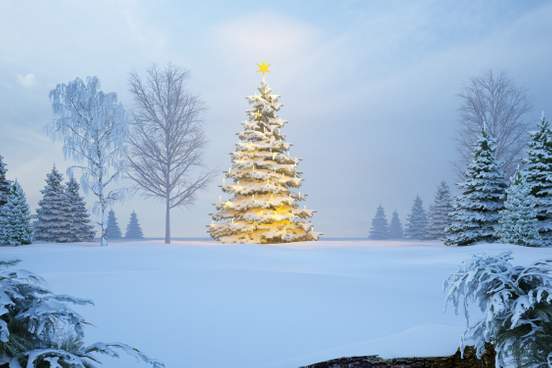
Christmas
The only word from this group to trace back to Latin roots is Christmas itself.
Christmas literally means “Christ’s mass.” Both Christ and mass came to Germanic languages from Latin before they arrived in England, as the late Roman Empire became Christianized and some religious terms spread throughout Europe. When the first Germanic speakers arrived in England from what is now Denmark and northern Germany, they brought with them a few words taken from Latin as part of what became the first recorded English vocabulary.
This group of terms wasn’t left behind by the earlier Roman occupation of Britain. These words of Latin origin were brought over by the new settlers, and also include street, belt, butter, chalk, cheese, wall, and wine. Religious terms that were brought over at that time include priest, bishop, nun, monk, pope, and hymn. They are among the first words of Latin derivation to be added to the Germanic language that became Old English; many thousands more would come following the Norman Conquest and the introduction of Latin-based scientific vocabulary during the Renaissance and Enlightenment.
Compression of compounds or syllables over time is frequently seen in words. That’s how Christ’s mass became shortened to Christmas, just as holiday comes from holy day. A few saints’ masses also became English words; they include Michaelmas, Martinmas, and Hilarymas.
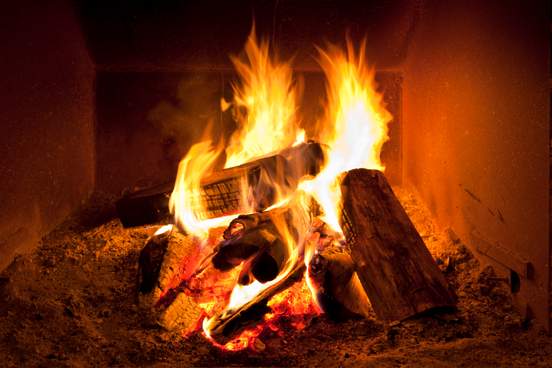
Yule
Yule is used as an informal, warm, and old-fashioned synonym for Christmas in songs, poems, and greeting cards. Yule was the name of the ancient winter solstice festival that pre-dated Christianity. In some ways the old overlapped with the new, and as the Christmas holiday became the most important December religious observance in Medieval England, it displaced pagan celebrations and the older term began to be used with the new meaning.
It gets doubly oldy-timey when we encounter this word as yuletide, meaning the Christmas season.

Merry
English has lots of synonyms for happy: cheerful, jolly, joyful, mirthful and even content. But none of them are more closely associated with Christmas than merry.
Merry dates back to Old English, meaning that it was in use before the 12th century, and, while it is occasionally used today in neutral contexts that have nothing to do with Christmas (unlike, say, hark or yule), it has a distinct archaic ring to it. We associate it with the medieval legend of Robin Hood and his “Merry Men,” and with the old-fashioned phrase make merry.
As a holiday gift to true word nerds: merry wears a special grammatical holiday sweater in the title of the song “God Rest Ye Merry, Gentlemen,” since merry describes the “rest” and not the “gentlemen.” "Rest you merry" or "rest ye merry" was a fixed phrase roughly meaning "peace and happiness to you," according to the Oxford English Dictionary. It really means “may you gentlemen rest happily,” and not “may you happy gentlemen now rest.” Think of merry here as merrily, since, in this case, merry is an (archaic) adverb.
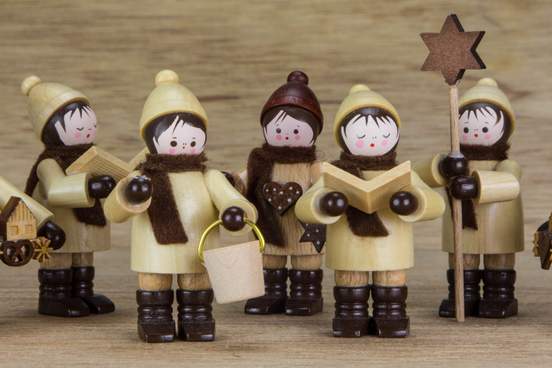
Tidings
Comprehension often comes from context. Most people probably don’t wonder too much about the meaning of tidings when they sing them in famous holiday songs:
Tidings of comfort and joy
And:
Good tidings we bring to you and your kin
And yet this word’s meaning maybe isn’t perfectly clear after all. It could be taken to mean “wishes” or “greetings,” with a general sense of “best wishes to you” or “happy greetings to you”—logical for the circumstances of a holiday song. But tidings really means “news” or, according to Samuel Johnson’s famous dictionary of 1755, “an account of something that has happened.”
So “good tidings” means “good news.” If you think that has a biblical ring to it, you’re on the right track, since tidings is used in the Book of Luke. Here is the King James Bible’s wording:
Fear not: for behold, I bring you good tidings of great joy, which shall be to all people.
Tidings is connected to the verb betide, another archaism, best known in the phrase “woe betide them,” meaning “may sadness befall them” or “may sadness happen to them.” Betide means “to happen to” and tidings are “happenings” or “news.” It’s no coincidence that tidings brings to mind Yuletide and Christmastide or even Eastertide. Tide here means “an ecclesiastical anniversary or festival or its season,” so Yuletide is when Yule “happens.”
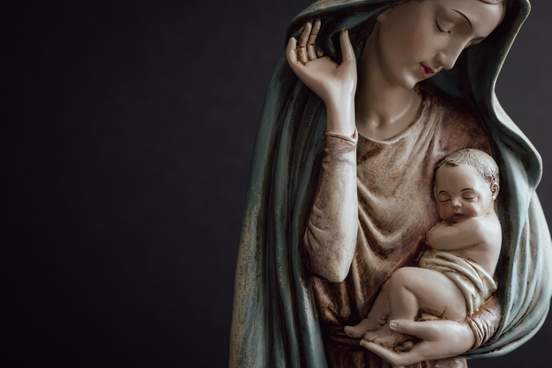
Yon
Yon is a synonym of yonder, meaning “at some distance” or “over there,” depending on whether the word is serving as an adjective or an adverb. We also enter the spelling yond for this word.
This is a truly old-fashioned sounding word in both its short and longer forms. Shakespeare used yon over thirty times in his plays, about half as frequently as he used yonder. In the song “Silent Night,” we see yon in its most famous use in a Christmas carol:
Silent night, holy night,
All is calm, all is bright
Round yon virgin mother and child
Vision is a part of the meaning of yon and yonder; our definition of the adverb is “at or in that indicated more or less distant place usually within sight.” It’s used to indicate something that you can see and point toward. The lyrics for “Silent Night” paint a picture in words, and “all is bright around that young mother and child” is what is being depicted. Round here is another archaic-sounding adverb, adding to the atmosphere of a long-ago scene.
Interestingly, these English lyrics weren’t written until the late 1800s, when yon and round were already evocative of the language of the past. It’s a deliberately nostalgic choice of words.
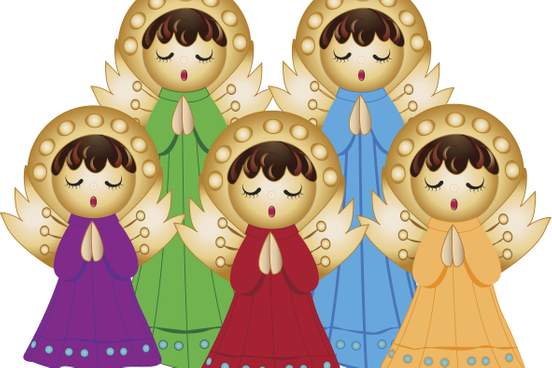
Hark
Hark and its older cousin hearken mean “to listen.” Hark is most famously used in the Christmas carol “Hark! The Herald Angels Sing,” the first line of which could be restated as “Listen to the messenger angels who are singing.” Hark is usually used, as it is here, in the imperative, as a command.
Both hark and hearken are still in current use in the phrases hark back to or hearken back to, which mean “to return to or remember (something in the past)” or “to look or seem like (something in the past).” These terms have mostly lost the literal meaning of “listen,” replacing it with “remember.” They derive from the call “hark back,” formerly used when hunting with dogs, meaning to return along the path or retrace the route when a scent is lost. The current meaning derives from the metaphor of seeking an earlier path.
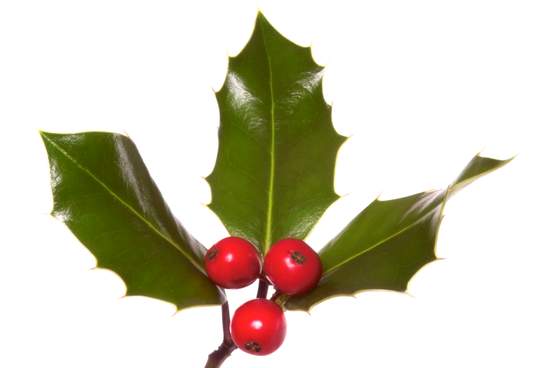
Deck
The verb deck in “Deck the Halls With Boughs of Holly” means “to decorate,” and it also sounds like a shortening of decorate, which would make it similar to the pairs hark/hearken and yon/yonder and yule/yuletide. Especially when used in poetry and songs, a single-syllable version of a word is a common enough phenomenon in English. But, oddly enough, this deck is unrelated to decorate, since deck comes from the Dutch word meaning “to cover” and decorate comes from the Latin word meaning “ornament.”
Other than in the old-fashioned Christmas song, we don’t see deck very much in contemporary English except in the phrase decked out, meaning “dressed or decorated in a fancy way.”

Don
In “Deck the Halls” we encounter the line:
Don we now our gay apparel
The verb don here means “to put on (an article of clothing).” The archaic nature of this particular word may be related to the oddness of the entire line in the lyric: first, the placement of the adverb now after the verb is formal and archaic sounding, and gay apparel seems like a very self-consciously poetic way to say “party clothes.”
But despite being redolent of an older kind of English, don is still used today when putting on an article of clothing is something other than just getting dressed for the day in your usual way:
don a uniform
don a costume
don a mask
Don is actually a contraction of “do on,” a bit like only is a shortened form of “one-ly” (meaning “alone” or “sole”). There is a corresponding term meaning “to remove an article of clothing”: doff comes from contracting “do off.” It’s still used in the phrase “to doff one’s hat,” removing one’s hat as a gesture of politeness or respect.
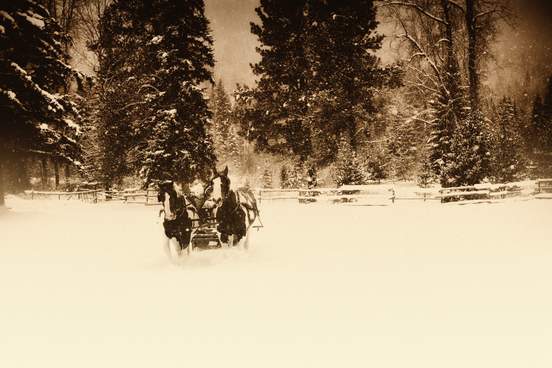
Yore
Yore means “of the past,” and that idea is what connects all these words from the lyrics of Christmas songs. They seem to reflect some version of the old days, whether the song is itself from Merry Olde England like “God Rest Ye Merry, Gentlemen” or written in America during the 1940s like “Have Yourself a Merry Little Christmas”:
Once again, as in olden days
Happy golden days of yore
It’s interesting to note that the nostalgia and yearning for the old days and folks from home mentioned in so many Christmas standards has itself been superimposed over the feelings of separation experienced by soldiers and their families during WWII, which is when several of the best-known ones were composed, including “Have Yourself a Merry Little Christmas,” but also “I’ll Be Home for Christmas,” and, of course, “White Christmas.”
And even though feelings of nostalgia are universal, not everyone is familiar with yore, which is sometimes sung as yours. And although we don’t doubt that you’ve known your share of “golden days,” this song, like all of these Christmas season tunes, is about a more generalized (and less specific) idea of the past.

Ye
When we encounter ye, we recognize it as a word that makes any song title or lyric sound old-fashioned. It’s the kind of vocabulary that we understand but rarely produce when speaking—except in very specific phrases, such as “Hear ye! Hear ye!” or in the songs “O Come, All Ye Faithful” and “God Rest Ye Merry, Gentlemen.” Ye means you, obviously, but only the plural you.
Originally the pronouns ye and you were used along with thee and thou to refer to people in the second person, ye and you for plural and thee and thou for singular. By the 1600s, you had displaced not only thee and thou but also ye, becoming the second person pronoun for both singular and plural. (This is why thee and thou also sound archaic to us, which makes some people mistake them for a more formal kind of pronoun, but, in fact, thee and thou were the informal, intimate pronouns and you the more formal one.)
There’s a funny thing about ye when you see it not as a pronoun referring to a person, but as an article replacing the, as in Ye Olde Candy Shoppe. This comes from the now-obsolete runic letter called the thorn, used for spelling the th combination; since the thorn looked a bit like the letter y, it’s often transcribed that way today.
If we use the thorn, the looks like þe. Seek and ye shall find the old spelling.

Auld lang syne
The end of the Christmas season for many is New Year’s Eve, and the saying auld lang syne, from the poem and the song, is heard and seen everywhere.
The words are from Scots, the variety of English spoken in Scotland, and literally mean “old long ago” or “old long since.” The phrase is used to mean “the good old times” that we reflect upon at New Year’s. It’s a meta way to refer to the “old times” with an expression that is itself redolent of older forms of English.





